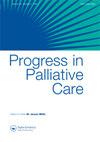澳大利亚养老机构委托临终关怀服务的评估
IF 0.8
Q4 PUBLIC, ENVIRONMENTAL & OCCUPATIONAL HEALTH
引用次数: 3
摘要
住宅养老机构在提供高质量的临终关怀方面面临严峻挑战。自2018年5月起,在澳大利亚昆士兰州西莫尔顿地区的三家乡村医院开展了一项由护士主导的支持乡村医院的临终关怀咨询服务试点。我们进行了一项混合方法评估,包括:对干预前后12个月内的死亡人数进行图表审计;与援助基金工作人员组成的焦点小组;以及对医院主管、主要家庭成员和全科医生的采访。定量和定性数据分别通过统计分析和专题分析进行评估。racf照顾了277名居民。干预前死亡24例,干预期间死亡44例(28例(64%)为CiMaS)。这项服务得到了广泛的支持。家属们感到得到了支持,也知道发生了什么。护理计划几乎总是记录在健康记录中。患者的症状似乎得到了更好的识别和管理。工作人员和设施经理比以前得到了更多的支持,在工作时间以外得到了更及时、更可靠的支持。未转介到CiMaS的患者有显著的护理改善,表明有学习效应。全科医生观察到护理人员的信心和对家庭的支持有所改善。与实施前一年相比,转诊病人和非转诊病人转到医院的人数都下降了三分之二。这个项目既高效又有效。本文章由计算机程序翻译,如有差异,请以英文原文为准。
Evaluation of a commissioned end-of-life care service in Australian aged care facilities
Residential aged care facilities (RACFs) face severe challenges in the provision of high-quality end of life care. A pilot of a nurse-led end-of-life palliative care consultative service (CiMaS) supporting RACFs was conducted in three RACFs in the West Moreton Region of Queensland, Australia, from May 2018. We conducted a mixed method evaluation comprising: a chart audit of deaths in the 12 months before and after the intervention; focus groups with RACF staff; and interviews with facility directors, primary family members and GPs. Quantitative and Qualitative data were assessed separately with statistical and thematic analyses respectively. The RACFs cared for 277 residents. There were 24 pre-intervention deaths and 44 in the intervention period (28 (64%) referred to CiMaS). There was widespread support for the service. Families felt supported and knowledgeable about what was happening. Care plans were almost always recorded in health records. Patients’ symptoms appeared to be better recognised and managed. Staff and Facility managers felt more support than previously, with more responsive and reliable out of hours support. There were significant care improvements in patients not referred to CiMaS, suggesting a learning effect. GPs observed improvements in nursing staff confidence and support to families. Transfers to hospitals fell by two-thirds for both referred and non-referred patients compared with the year before implementation. The program was both efficient and effective.
求助全文
通过发布文献求助,成功后即可免费获取论文全文。
去求助
来源期刊

PROGRESS IN PALLIATIVE CARE
PUBLIC, ENVIRONMENTAL & OCCUPATIONAL HEALTH-
CiteScore
2.60
自引率
11.80%
发文量
24
期刊介绍:
Progress in Palliative Care is a peer reviewed, multidisciplinary journal with an international perspective. It provides a central point of reference for all members of the palliative care community: medical consultants, nurses, hospital support teams, home care teams, hospice directors and administrators, pain centre staff, social workers, chaplains, counsellors, information staff, paramedical staff and self-help groups. The emphasis of the journal is on the rapid exchange of information amongst those working in palliative care. Progress in Palliative Care embraces all aspects of the management of the problems of end-stage disease.
 求助内容:
求助内容: 应助结果提醒方式:
应助结果提醒方式:


